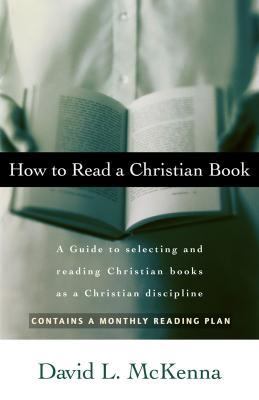
How To Read A Christian Book
A Guide to Selecting and Reading Christian Books as a Christian Discipline

![]()
© 2001 David L. McKenna
Published by Baker Books, Grand Rapids, Michigan
1. Christians — Books and reading 2. Christianity and literature
3. Christian literature — Bibliography 4. Christian literature
— History and criticism
BV4526.2 .L58 || Dewey: 248.4/6 ||
LCCN: 7619525 ||
OCLC #45002126
|| 143p.
How To Read A Christian Book is presently held by 120 libraries including Bethel Seminary and the Library of Congress.
Table of Contents
![]()
Preface ... 8
Acknowledgments ... 10
1. Why Christians Are Readers ... 11
2. Choosing a Christian Book ... 28
3. Judging a Christian Book ... 43
4. Reading Christian Books as a Spiritual Discipline ... 55
5. Planning a Personal Christian Library ... 71
6. Introducing a Three-Year Christian Reading Plan ... 91
7. Anticipating the Christian Classics ... 107
Appendix A: Reference Library for Christian Readers ... 124
Appendix B: Great Books of Christian Devotion ... 129
![]()
Christians are reading more and more books. The sale of Christian books continues to be a boom industry — in bookstores, in supermarkets, and over the Internet. Certainly, nothing but good can come of our "print witness" amid the media of a secular society.
Yet, questions remain.
We know the volume of sales of Christian books, but do we know the quality of their contents?
We know which books are best-sellers in the Christian marketplace, but do we know whether Christians are reading with discernment?
We know that millions of Christian books have been printed in the last fifty years, but do we know how many of them have the potential to become classics?
We know that people are reading Christian books dealing with personal problems, but do we know whether Christians are understanding the faith and growing spiritually?
Page 9
We know that books of quality are being written by Christian scholars, but do we know whether books of substance are being produced for laypeople?
We know that Christian books are being written to inspire, but do we know the value of Christian reading as a spiritual discipline?
Most important of all, we know that millions of Christians are reading books, but do we know whether all the members of Christian homes, especially the younger generation, are among the readers?
Questions such as these provided the incentive for How to Read a Christian Book. The purpose of this book is simple and straightforward: As a lover of Christian books, I want to enhance the potential of their ministry by encouraging readers to choose books of quality, judge their content with discernment, develop a reading habit as a spiritual discipline, and build their own personal library. To accomplish these purposes, this book contains a three-year plan for reading contemporary books that meet the standards of biblical credibility, lay readability, literary quality, and developmental value to help Christians understand the Christian faith and grow spiritually. If these purposes are achieved, to God be the glory!
![]()
While one person may write a book, many people are part of the project. As author of How to Read a Christian Book, I owe a special word of thanks to those who shared the vision and supported the work. My thanks go to:
Dwight Baker, president of Baker Books
Donald Demaray, Senior Beeson Professor Emeritus of Homiletics at Asbury Theological Seminary
Sheila Lovell, executive assistant to the president at Asbury Theological Seminary
Janet McKenna, my wife of fifty years who loves to have me stay home and write in my retirement.
Members of the selection committee who helped me choose the thirty-six books for the three-year reading plan.
Leith Anderson, Jill Briscoe, Maxie Dunnam, Ted Engstrom, Vernon Grounds, Jack Hayford, Jay Kesler, James Earl Massey, Rebecca Manley Pippert, Rick Warren
![]()
From the Back Cover
If you feel overwhelmed by the huge selection of reading material in bookstores, you'll find this book a welcome resource. Author David McKenna realizes that readers today face a dizzying array of choices, ranging from the classics to modern fiction. "Although we're reading more, we may not be reading what is best," says McKenna.
How to Read a Christian Book offers helpful methods for choosing and reading books, judging the quality of books, and building a personal library. The author emphasizes the importance of reading as a spiritual discipline and suggests that we should be reading Christian books as part of our daily schedule.
McKenna provides a practical three-year plan for reading contemporary books of Christian value, with listings by category such as autobiography, Bible study, and devotionals. He also includes a chapter on the Christian classics.
As readers, we are "adventurers in the quest for hidden treasures," McKenna says. How to Read a Christian Book gives valuable assistance in searching out those treasures.
All rights reserved. Used by permission. No portion of this online edition of the book may be reproduced in any form or by any means, except for brief quotations for the purpose of review, comment, or scholarship, without written permission from the author.
![]()
How To Read A Christian Book is hosted
online by ccel.us

christian books online books